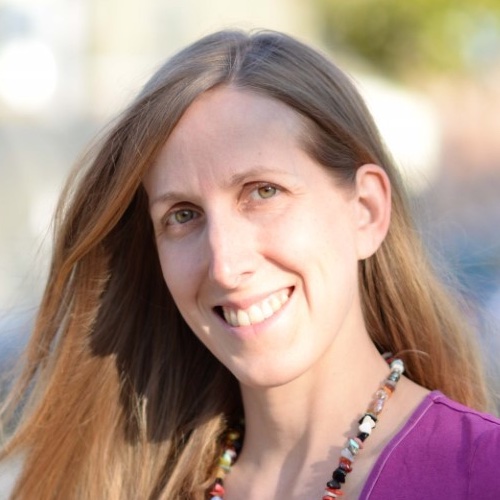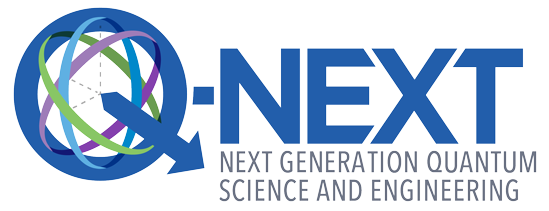collaboration
-
Quantum capital of the world: emerging field that could solve ‘unsolvable’ problems
From WGN News: Chicago is aiming to become the quantum capital of the world. Public and private investment, workforce efforts, tech startups, and collaboration across academia, government and industry are all helping position Illinois as a leader in the quantum revolution. The WGN news piece features Q-NEXT Director David Awschalom and Q-NEXT collaborator Pranav GQuantum capital of the world: Emerging field that could solve ‘unsolvable’ problems okhale of Infleqtion. Read More
-
Share your Q-NEXT successes with us
by David Awschalom Our first three years at Q-NEXT have been tremendously productive. The collaboration has commissioned new quantum foundries at Argonne and SLAC, reported over 120 Q-NEXT supported results, including a Roadmap for Quantum Interconnects, filed multiple patents and software copyrights, and contributed… Read More
-

Advancing science, collaboration, and the quantum workforce at Q-NEXT
In late May, Jennifer Dionne stepped into the role of Q-NEXT deputy director. She looks forward to growing the research infrastructure needed to make large-scale quantum information systems practical, helping bolster industry collaborations, and bringing up the next generation of scientists. Read More
-
New center aims to expand the role of semiconductors
From the University of Wisconsin–Madison: The new Wisconsin Center for Semiconductor Thermal Photonics at the University of Wisconsin–Madison will combine research in photonics, thermal science and quantum science to understand how semiconductors could be used to control the flow of heat. Read More
-
PASQAL and University of Chicago announce neutral atoms quantum computing research collaboration agreement
University of Chicago's Hannes Bernien forms a new collaboration with PASQAL to advance neutral-atom quantum computing by developing new techniques for enabling high-fidelity qubit control. Read More
-
Global quantum alliances forged at London colloquium led by UChicago
From the University of Chicago: Leaders in quantum science, economics, defense, and data science from the United States and the United Kingdom met in London for a Quantum and Data Science Workshop hosted by the University of Chicago. The two-day conference gathered key representatives from both countries to forge new alliances and strengthen existing partnerships in the global race to establish quantum technology and explore the growing data science industry. Read More
-
The United States and Denmark take steps to strengthen quantum cooperation
From quantum.gov: Following the June 3 meeting between the United States Secretary of State Antony Blinken and Danish Minister of Foreign Affairs Jeppe Kofod, the United States and Denmark signed a Joint Statement on Cooperation in Quantum Information Science and Technology. Leveraging both countries’ strengths in QIST, this cooperation statement will strengthen the supply chain, grow the industrial base, and educate future generations of quantum talent. Read More
-
Quantum information science initiative bridges fundamental discoveries to future technologies
From the U.S. Department of Energy: The U.S. Department of Energy National Quantum Information Science Research Centers aim to accelerate the transformational advances in fundamental science and quantum-based technology needed to develop world-leading capabilities in quantum information science. Read More
In the News
See all In the News-
The best qubits for quantum computing might just be atoms
From Quanta: Mark Saffman of the University of Wisconsin–Madison and Infleqtion is featured in this comprehensive overview of neutral-atom qubit research. Read More
-
How quantum computing could help us understand the universe
From PBS NewsHour: David Awschalom appears in this piece on the next generation of computing, one that will be far more sophisticated and dependent on understanding the subatomic nature of the universe. Read More
-
PME-led research into protein-based qubits earns $2.75M Moore Foundation grant
Bolstered by a new $2.75 million grant from the Gordon & Betty Moore Foundation, a team led by University of Chicago's Peter Maurer will soon study qubits made from protein. Read More
-
Infleqtion unveils 5-year quantum computing roadmap, advancing plans to commercialize quantum at scale
From Quantum Insider: Infleqtion shares a broad business update, including the first look at its new 5-year quantum computing roadmap. The roadmap's centerpiece is Sqorpius, the next phase of Infleqtion’s quantum computing program. Read More
-
Bringing quantum entanglement to the people
From the National Science Foundation: NSF’S Quantum Leap Challenge Institute Hybrid Quantum Architectures and Networks at the University of Illinois Urbana-Champaign, a Q-NEXT partner, has created a working demonstration that brings entanglement between photons to a public setting for the first time. Read More
